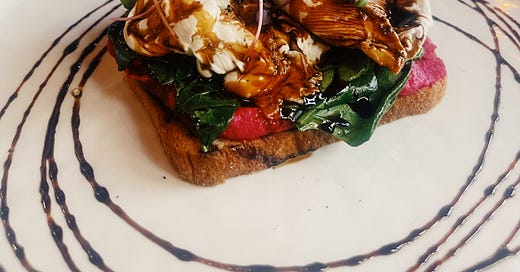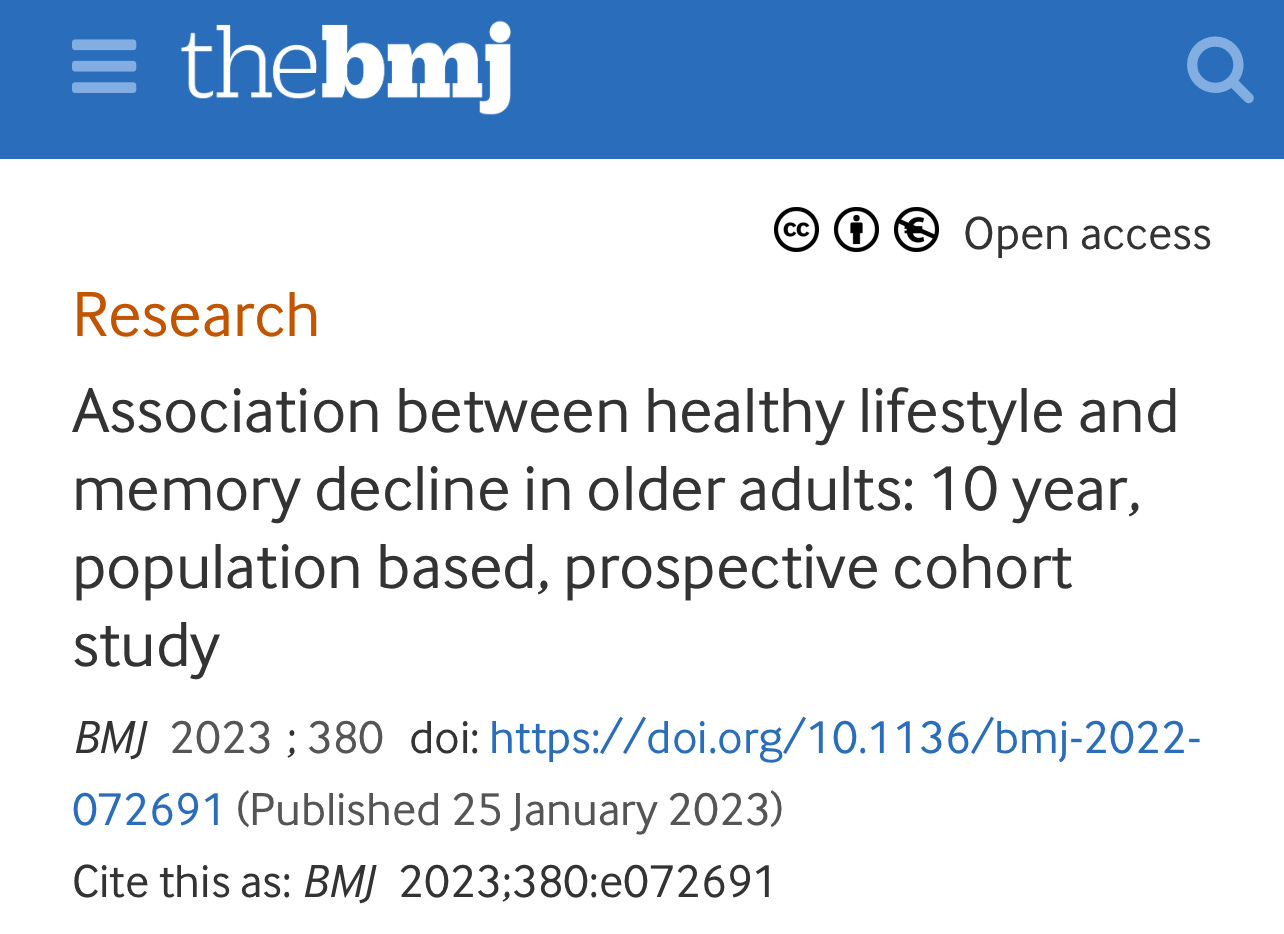6 Real-Life Takeaways From Recent Brain-Health Studies
Plus, an easy recipe for kimchi toast with beet hummus
Hello, everyone. I’ve been writing to you a lot from the sky! Today I am en route to Denver from Panama for the next leg of the Brain Health Kitchen book tour. I packed local chocolate and dried mango—a departure from my normal plane snacks. From the responses to last month’s FAQ post, I learned that you want more summaries of brain health research and off-the-cuff recipes. So today I’m sharing a recap of recent brain health news, including a few key studies from the last six months, plus real-life takeaways.
In the food department, I thought you might like to make this beautiful kimchi toast with beet hummus that we enjoyed at the Panama Brain Health Retreat. I have a loose recipe, thanks to Chef Fernando, so you can make it at home. This post is open for everyone to read and comment, so please feel free to share.
Brain Health News 2022/2023
When I was preparing slides for my talks at the Brain Health Retreat, it struck me how I never give the same presentation twice. I am constantly updating my deck as new studies about Alzheimer’s prevention are published each month. Just in the last six months, knowledge in the field has taken a big leap forward. Here are the key findings:
Women ApoE4 Carriers Should Consider HRT
What we already know:
Women are twice as likely to be diagnosed with Alzheimer’s than men.
Women have greater tau deposition in key brain regions compared to men, thanks to a recently discovered gene linked to the X chromosome.
The perimenopausal years are a vulnerable time for women’s brains because Alzheimer’s pathology is accelerated by hormonal changes.
Estrogen is neuroprotective. Hormone therapy may be associated with reducing dementia in some (but not all) studies.
Starting HRT early (within 5 years of menopause) is key; late starters may not get the same benefits and are more likely to have adverse effects.
The study: This January 2023 paper from Europe provides important information to help us understand which women are most likely to be helped by HRT. Researchers looked at the brain health benefits of taking HRT in two groups of 1,178 women: those who carry one or two copies of the ApoE4 risk gene for Alzheimer’s, and those who do not. They compared HRT users with non-users, and noted whether HRT was started early or late in the perimenopausal transition. Participants were followed with cognitive testing and brain imaging over time.
Results: ApoE4 carriers who took HRT starting early in the perimenopause had the best results. They performed better on cognitive tests, especially word retrieval and delayed memory tasks. They also had larger brain volume in key areas like the hippocampus (important for short term memory) and the amygdala (which has a central role in anxiety and stress response).
I wrote about this study in more detail here.
The takeaway: HRT may help women ApoE4 carriers as part of their Alzheimer’s prevention strategy. Starting early in the menopausal transition is key. Going forward, studies evaluating HRT and dementia risk should take into account the carrier status of participants.
Medi and MIND diets reduce Alzhzeimer’s pathology in the brain, and leafy greens are particularly important
What we already know: Closely following the Mediterranean and MIND dietary guidelines reduces Alzheimer’s risk by about half. Switching from a Western-style diet to a Mediterranean one yields a reduction in biomarkers (amyloid and tau proteins detected by brain imaging in spinal fluid, for example) for Alzheimer’s after just 3 years. Eating leafy greens has been shown to reduce Alzheimer’s pathology seen on brain imaging.
The study: This March 2023 study from Rush University was the first one to compare the Mediterranean and MIND dietary patterns with pathology—beta-amyloid plaques and tau tangles detected in the brain after death.
Results: Both brain-protective diets significantly slowed Alzheimer’s pathology, but they differed slightly in which protein and the degree. Mediterranean diet followers had brains that looked 18 years younger at autopsy primarily because they were less apt to have beta-amyloid accumulation. MIND diet followers had brains that looked 12 years younger, with an emphasis on less tau pathology.
In both groups, leafy greens proved to be the most powerful food group in reducing Alzheimer’s pathology.
The takeaway: This study gives us definitive information about the impact of certain food groups on Alzheimer’s pathology. Leafy greens, once again, are proven to be a powerful tool against this disease. While this study shows the Mediterranean diet reduces amyloid accumulation slightly better than the MIND diet, this doesn’t mean it’s a better diet, but rather they work in different ways. That’s exciting news for Alzheimer’s prevention.
I went into more detail about this study here, where you can also take my How Mediterranean is Your Diet downloadable quiz.
Flavonols help with global memory
What we already know: Flavonols (a type of flavonoid) are bioactive compounds in plant foods that have a special impact on brain health. In 2020, when researchers at Rush University studied dietary patterns and Alzheimer’s, these flavonols stood out: isorhamnetin, kaempferol, and myricetin. Study participants who ate an abundance of foods that included these particular flavonols had between 38% and 50% fewer cases of Alzheimer’s after 4.5 years. The top flavonoid foods were kale, beans, green tea, spinach, broccoli, apples, oranges, pears, tomatoes, pears, olive oil, and wine.
The study: Association of Dietary Flavonols with Changes in Global Cognition and Several Cognitive Abilities by Dr. Tom Holland and his group at Rush University showed that this same flavonol-rich diet was strongly linked to better performance on these cognitive skills:
semantic memory—the ability to retrieve words from long term memory
working memory—the ability to keep in mind a small amount of information used in the execution of cognitive tasks, like remembering an address while listening to directions on how to get there
visuospatial ability—the capacity to identify visual and spatial relationships among objects, like understanding the differences and similarities between objects
perceptual speed—the ability to quickly and accurately compare similarities and differences among sets of letters, numbers, objects, pictures, or patterns
I spoke with Dr. Tom Holland shortly after this paper came out. You can access our full conversation here.
The takeaway: Eating a brain-healthy diet is not just for preventing Alzheimer’s decades down the road; it helps keep memory and thinking skills sharp now. Paying attention to the flavonoid content of food is a smart strategy for taking care of your brain. I wrote in more detail about flavonoids here.
These 5 Brain Healthy Lifestyle Factors Slow Memory Decline
What we know: Following a brain-healthy diet is the most powerful lifestyle factor shown to reduce dementia risk, but several studies have shown that other healthy habits are also important. Different lifestyle factors act synergistically with diet—adding even more layers of protection for the brain. Some of these factors include exercise, not smoking, minimal or no alcohol intake, staying cognitively active, stress mitigation (like meditation and mindfulness practices), and being socially connected. A study published in JAMA in 2020 showed that following 4 of 5 brain-healthy lifestyle factors may reduce dementia risk by 60% overall and 32% in ApoE4 carriers.
The study: In this 2022 study published in the British Medical Journal, Chinese researchers followed more than 29,000 people over 60 for 10 years. They were half male, half female, and 20% carried an ApoE4 gene. Participants were categorized into groups based on the number of healthy lifestyle factors they follow: healthy diet, regular physical exercise, active social contact, cognitive engagement, never or former smoking, never drinking.
Those who followed more favorable lifestyle factors aged with slower cognitive decline, especially in verbal and memory skills. ApoE4 carriers in the favorable lifestyle group also had slower decline. A brain-healthy diet was the most important lifestyle factor studied, followed by cognitive activity, exercise, social contact, not smoking, and not drinking.
The takeaway: Even though lifestyle factors are extremely difficult to study in large populations, we now have four studies all coming to similar conclusions: Healthy habits help the brain age more slowly, with better memory and less dementia risk. In each of these studies, a brain-healthy diet rises to the top as the most impactful lifestyle habit.
Focus On Healthy Bones For A Healthy Brain
What we know: “What’s good for the heart is good for the brain” is a longstanding concept in Alzheimer’s prevention. Now researchers are starting to look at bone health through a similar lens. The little-known “brain-bone axis” refers to the relationship between healthy bones and a healthy brain. For example, osteocalcin is a hormone created in healthy bones. It crosses the blood brain barrier and regulates memory and cognitive functions.
The study: Published last week in the journal Neurology, this study looks at the relationship between poor bone mineral density and dementia risk. Researchers studied 3,651 participants for over 20 years to see if low bone density could predict dementia later in life. And it did: those with the lowest bone density (especially in the femoral neck) had the greatest risk of dementia over time.
The takeaway: Add healthy bones to your list of important factors that may protect the brain. Further studies are needed to determine if this is a cause and effect relationship, but it makes sense that healthy bones are key for fending off frailty and maintaining physical fitness with age. To maintain good bone health, be sure to practice some form of weight-bearing exercise for a minimum of 30 minutes twice a week, don’t smoke, and be a non- or light drinker. Be sure to get enough vitamin D and calcium in the diet, too.
Kimchi Toast with Beet Hummus
This spicy, protein-packed toast may look fancy but it’s easy to recreate at home. It’s one of my favorite breakfasts from the Panama Brain Health Retreat. Each day, Chef Fernandez treated us to brain-healthy food using local ingredients. I especially love how the tart and spicy kimchi plays off the sweetness of the beet hummus. Sometimes I skip the eggs.
Here’s how to make it at home for 2 people: Puree 1½ cups store-bought or homemade hummus in a blender or food processor with 1 small roasted beet. (Sometimes you can buy these already roasted in the produce section of the grocery store.) Season with salt, pepper, and a generous squeeze of fresh lemon juice. Meanwhile, sauté 2 handfuls of spinach in a drizzle of extra-virgin olive oil. Once wilted, push to the side of the pan and add 2 eggs. Gently fry the eggs, sunny-side up. Meanwhile, toast 2 thick slices of whole grain bread. Spoon the hummus atop each piece of toast, pile on the spinach, 2 generous spoonfuls of kimchi, and finish with the eggs and microgreens, if you have some. Chef Fernandez adds a final drizzle of tamarind sauce, but you can use good balsamic vinegar instead.
Book Tour News


I’ll be in Colorado this whole week with book events in Denver an Boulder. Next week: Cincinnati, New York, and Boston. Then I’ll be headed to Rancho La Puerta as the Visiting Chef the week of April 22 to 29. In May, I am really excited to be back in California for several events in the Bay area. San Francisco friends: I’ll be doing a hands-on cooking class at the Civic Kitchen. You can grab a spot here or just check out what’s on the menu.
You’ll find all updated Brain Health Kitchen tour event information here.
Until next time, have the best week.
Love,
Annie









Hi Annie, I loved how you summarized all the exciting new research and then put a link in there for me detail! Really appreciate it :) Sounds like leafy greens (along with other things) is a real winner. I am going to see if I can tackle the Kimchi/beet toast. Looks like it is full of flavor! I wish I knew in my younger days that healthy food could taste great. By the way, my daughter had a great time meeting you and the other authors on Brain health at the Boulder Book store!! If you are ever in my area, I will have to catch one!